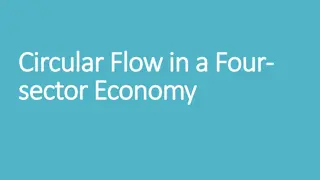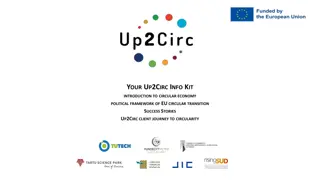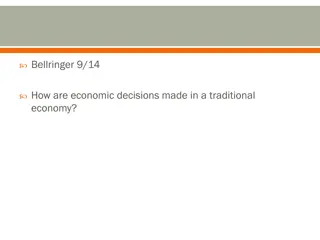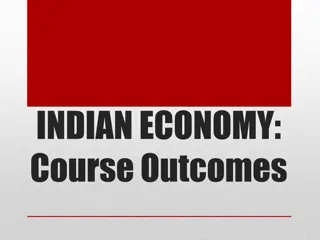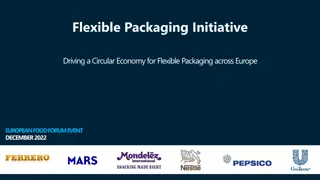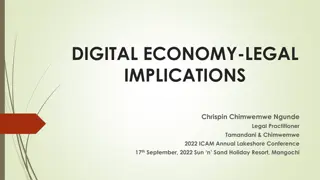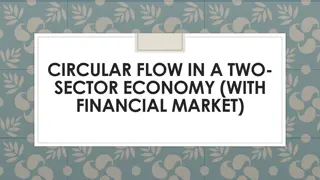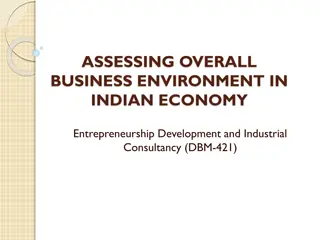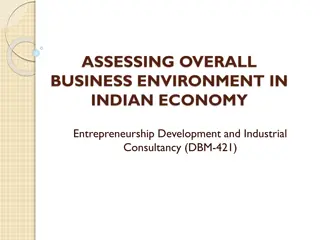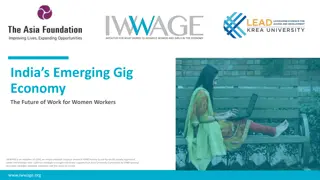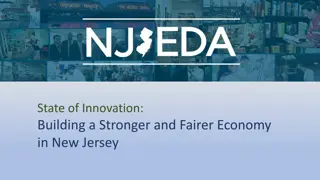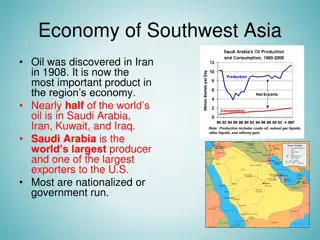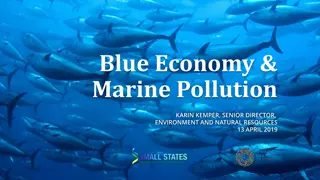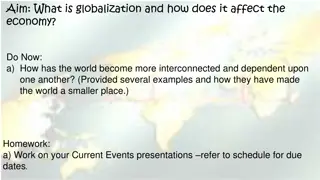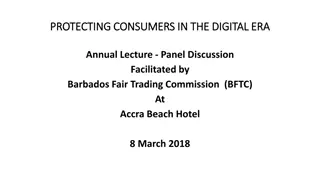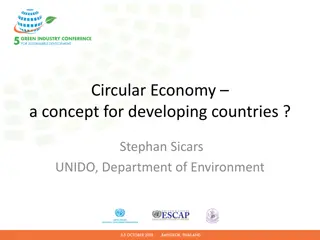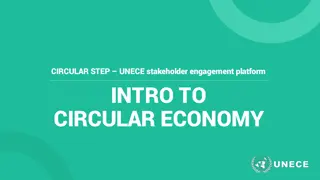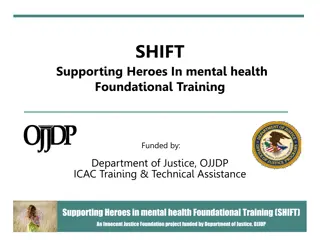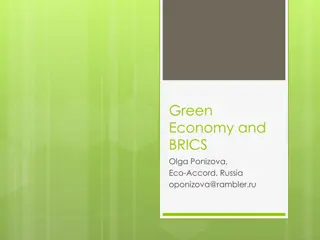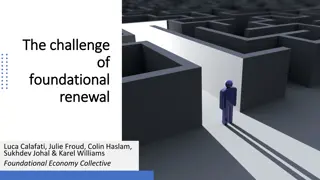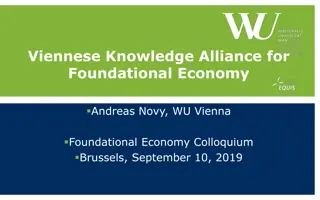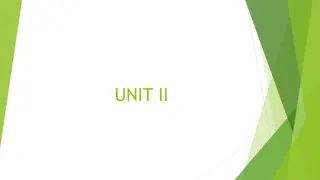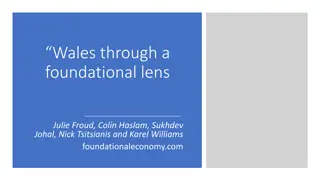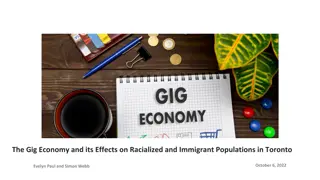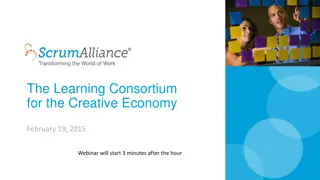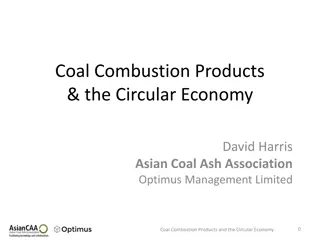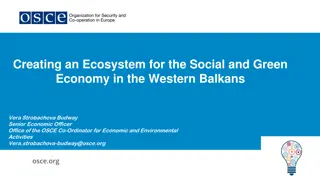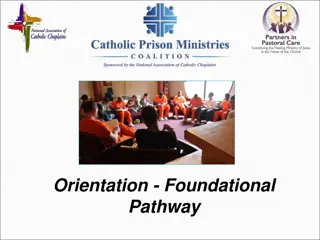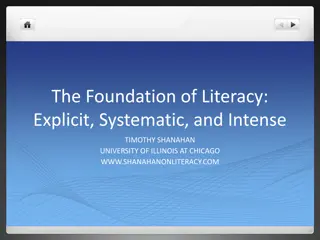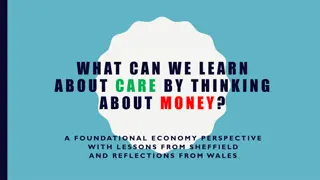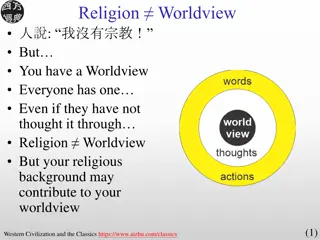Sustainability and the Blue Economy Concepts
The intertwining concepts of sustainability and the blue economy, focusing on historical developments, environmental protection events, and the emergence of sustainability science. Discover the pillars supporting a sustainable blue economy and pathways for inclusive development.
15 views • 40 slides
Circular Flow in a Four-Sector Economy Explained
The circular flow in a four-sector economy involves households, firms, government, and the foreign sector. Each sector plays a crucial role in money flows and payments, contributing to the continuous flow of income. The financial market also has a significant impact on the economy by accumulating sa
3 views • 8 slides
Glossary of Key Terms
Explore essential terms in economics such as command economy, consumer, demand, economic system, free enterprise system, goods, innovation, market economy, marketplace, mixed economy, needs, producer, profit, resources, scarcity, services, supply, technology, trade-off, traditional economy, and want
3 views • 6 slides
Accelerating Towards a Circular Economy Future
The circular economy presents a vital solution to tackle climate change by focusing on regenerative growth, reducing resource consumption footprint, and enhancing material use efficiency. The EU's Circular Economy Action Plan aims to usher in a sustainable future through decoupling economic growth f
2 views • 19 slides
Leveraging Non-Oil Exports for Nigeria's Blue Economy Growth
Nigeria Export Promotion Council (NEPC) focuses on diversifying Nigeria's economy by promoting non-oil exports for sustainable growth. The Blue Economy concept involves sustainable use of ocean resources for economic development. Nigeria's abundant ocean resources such as maritime transportation, fi
0 views • 20 slides
Economic Systems in the United Kingdom, Germany, and Russia
Economic decisions in traditional economies are based on customs and beliefs. The United Kingdom has a mixed market economy with a focus on service industries, while Germany's economy is export-based. Russia's economy leans towards a command system. By comparing these economic systems, one can see h
0 views • 11 slides
Understanding Indian Economy: Course Outcomes and Resources
Explore the course outcomes of the Indian Economy, covering economic development, policies, population growth, planning, agriculture, Kerala's economy, and resources for further study. Access government data and publications on the Indian economy for comprehensive learning.
0 views • 9 slides
Advancing Circular Economy Through Flexible Packaging Initiative
Flexible Packaging Initiative is driving a circular economy in Europe by emphasizing the importance of flexible packaging, showcasing key benefits, and outlining steps to ensure circularity in the recycling value chain. The initiative supports harmonized sorting labels, eco-modulated fees, and the p
5 views • 5 slides
Legal Implications of the Digital Economy in Malawi
Explore the legal implications of the digital economy in Malawi as discussed at the ICAM Annual Lakeshore Conference. Topics include the Electronic Transactions and Cyber Security Act, principles of implementation, Malawi CERT, data privacy, and the significance of the digital economy in transformin
0 views • 44 slides
Understanding Circular Flow in a Two-Sector Economy with Financial Market
In a two-sector economy with a financial market, households and firms engage in savings, investments, and borrowing through the financial market, unlike the simple circular flow assumption where no savings are made. This interaction between households, firms, and the financial market plays a crucial
0 views • 4 slides
Overview of Modern Business Environment in Indian Economy
Modern business in the Indian economy is characterized by large size, oligopolistic nature, diversification, global presence, technology orientation, and changing government regulations. The Indian economy features a mixed economy with both private and public enterprises, low per capita income, uneq
0 views • 14 slides
Overview of Business Environment and Economy in India
Business environment in India encompasses a mix of large, oligopolistic, diversified, and technologically oriented enterprises. The Indian economy is characterized by a mixed economy, low per capita income, and limited entrepreneurial potential. External and internal factors influence business opera
0 views • 14 slides
Insights into India's Thriving Gig Economy and Future Work Trends
India's gig economy, spearheaded by initiatives like IWWAGE, is reshaping the future of work, particularly for women. Key questions revolve around the gig economy's impact, legislative frameworks, and COVID-19 repercussions. Academia investigates the rise of gig work, focusing on platforms like Uber
0 views • 11 slides
Transforming New Jersey's Economy for Growth and Equality
New Jersey aims to revitalize its economy by focusing on key goals for 2025, including driving job growth, increasing wages, fostering diversity in STEM fields, erasing gender and racial wage gaps, and reducing poverty in urban centers. The plan involves investing in people, communities, innovation,
3 views • 5 slides
Strategic Creativity in Tourism Business: Unleashing Innovation and Growth
Explore the dynamic landscape of strategic creativity in tourism business through the lens of the experience and attention economy. Discover how creativity-based approaches can reshape planning and generate novel opportunities in the tourism sector. Delve into the concepts of the experience economy,
5 views • 14 slides
Economy of Southwest Asia: Oil, OPEC, and Cultural Influences
Oil discovery in Southwest Asia transformed the region's economy, with OPEC playing a key role in pricing. Primary products like oil and secondary goods influence the economy. Islam shapes the culture, while debates on Westernization persist.
1 views • 10 slides
The Blue Economy and Marine Pollution: A Comprehensive Overview
The presentation outlines the thriving ocean economy, the concept of the Blue Economy, the World Bank's approach, risks faced by oceans, and the impact of marine pollution on Small Island Developing States and coastal regions. It emphasizes sustainable development of oceanic activities, collaboratio
1 views • 12 slides
Understanding Globalization's Impact on the Economy
Globalization is the increasing unification of the world's economy, leading to greater interconnectedness and interdependence among nations. It has facilitated the exchange of products, services, and ideas globally, impacting economies worldwide. While it offers benefits such as increased productivi
0 views • 10 slides
Consumer Protection in the Digital Economy: Challenges and Solutions
Exploring the relevance of consumer protection in the digital economy, this content delves into defining the digital economy, top countries in retail internet sales, and initiatives like the CARICOM Model Consumer Protection Bill. It addresses issues of jurisdiction in cross-border transactions and
0 views • 9 slides
Circular Economy as an Opportunity for Developing Countries
Circular economy presents an opportunity for developing countries to generate wealth, reduce environmental footprint, and promote sustainable practices. By extending product lifetimes, reusing resources, and minimizing waste, developing nations can benefit from economic interests while complementing
0 views • 9 slides
Introduction to Circular Economy and UNECE Stakeholder Engagement
Explore the concept of Circular Economy focusing on reducing, reusing, recycling, and recovering materials for economic sustainability and environmental quality. Learn about UNECE's role in promoting circular economy principles, stakeholder engagement, and activities aimed at sustainable resource ma
0 views • 4 slides
Supporting Heroes in Mental Health Foundational Training (SHIFT)
SHIFT is a foundational training program funded by the Department of Justice, OJJDP, aimed at addressing the long-term effects of chronic exposure to traumatic material. The program focuses on supporting, educating, and empowering individuals in the mental health field to mitigate negative effects a
8 views • 5 slides
Insights into Social Economy and Social Dialogue Research Outcomes
Research outcomes from the Mesmer+ project at HIVA KU Leuven reveal misalignments in social dialogue inclusiveness, challenges faced by social economy entities, and the role of employers in the social economy. Recommendations include enhancing the role of social economy employers and promoting inclu
1 views • 7 slides
Addressing the Science of Reading in Secondary Education
Press reports suggest schools are not prioritizing foundational reading skills, impacting students' reading proficiency in all grades. Addressing this gap is critical for boosting literacy achievement from Grades 6 to 12, emphasizing the importance of foundational skills alongside comprehensive text
1 views • 36 slides
Exploring the Green Economy and BRICS Cooperation
The discussion focuses on the importance of the green economy for BRICS nations, suggesting ways for collaboration, especially in addressing climate change and transitioning to a low-carbon economy. The BRICS countries play a crucial role in global stability and sustainable development. Features of
0 views • 22 slides
The Challenge of Foundational Renewal in Economy
The challenge of foundational renewal encompasses two distinct eras - FE 1.0 (1880-1950) focused on urban and industrial society, while FE 2.0 (post-2020) aims to address climate change and biodiversity. Despite past achievements, obstacles like structural changes and lack of leadership hinder progr
0 views • 14 slides
The Impact of Pandemics on the Shadow Economy Performance
Pandemics have a significant impact on the shadow economy, influencing the legal economy in various ways. The shadow economy serves as a buffer for high unemployment rates and can contribute to budget revenues through legal spending. Studies suggest that a growing shadow economy may reflect dissatis
0 views • 12 slides
Vienna Knowledge Alliance for Foundational Economy
Vienna Knowledge Alliance for Foundational Economy focuses on building social-ecological infrastructure, promoting universal basic services, and fostering a good life for all in Vienna. The alliance involves practitioners, researchers, civil authorities, and civil society in co-creating sustainable
0 views • 14 slides
Optimizing Foundational Treatments for HFrEF: Guideline Recommendations and Implementation Strategies
Highlighting the current guideline recommendations for treating patients with Heart Failure with Reduced Ejection Fraction (HFrEF), this educational slide module emphasizes the importance of implementing the recommended therapies effectively. It covers the foundational treatments recommended by vari
0 views • 28 slides
Evolution of Services Marketing in the Modern Economy
The shift towards a service economy has transformed marketing practices, leading to the emergence of Services Marketing as a distinct discipline. This evolution highlights the unique characteristics of services, such as intangibility and simultaneous production-consumption. The 1980s mark a pivotal
0 views • 13 slides
Rethinking the Economy: The Foundational Lens on Wales
Foundational Economy redefines economic activity in Wales beyond GDP, focusing on essential sectors like utilities, transportation, healthcare, and education. It emphasizes the significance of foundational activities in driving sustainable growth and social welfare, challenging traditional economic
0 views • 16 slides
Optimal Approach to NG9-1-1 Implementation: Task Force Report
Task Force on Optimal PSAP Architecture releases a report detailing the optimal approach to Next Generation 9-1-1 implementation. The report discusses the NG9-1-1 ecosystem, transitional steps, public safety migration steps, and foundational elements necessary for a successful transition to NG9-1-1.
0 views • 44 slides
Understanding the Impact of the Gig Economy on Marginalized Groups in Toronto
This report delves into the effects of the gig economy on racialized and immigrant populations in Toronto. It outlines research findings, stakeholder insights, and strategic recommendations to address the challenges faced by marginalized groups in the gig economy. The study aims to shed light on the
0 views • 25 slides
The Learning Consortium for the Creative Economy Webinar Summary
The webinar on The Learning Consortium for the Creative Economy discussed key topics such as agenda details, presenters' backgrounds, poll results, and insights on the Creative Economy and its importance. Participants engaged in discussions on topics like the Recap on the Creative Economy, Scaling o
0 views • 43 slides
Coal Combustion Products & the Circular Economy - Addressing Resource Flow Challenges
This discussion delves into the intersection of coal combustion products and the circular economy, emphasizing the need for continuous re-evaluation of resource chains, ecosystem metabolisms, and industrial innovations to ensure sustainable environmental practices and economic growth. Exploring the
0 views • 24 slides
Advancing Social and Green Economy in Western Balkans
Creating an ecosystem for social and green economy in the Western Balkans is crucial for fostering peace, reducing disparities, and promoting sustainable business models. Initiatives like promoting innovation, job creation, and skills development among young entrepreneurs are key to driving growth a
0 views • 7 slides
National Online Foundational Training in Catholic Prison Ministry
Welcome to the recognized and approved National Online Foundational Training endorsed by the US Conference of Catholic Bishops. This program, sponsored by the National Association of Catholic Chaplains and developed by the Catholic Prison Ministries Coalition, aims to provide essential resources for
0 views • 22 slides
Importance of Foundational Literacy Skills in Early Reading Development
Early literacy skills play a crucial role in predicting academic success and reducing reading problems. Regardless of the reasons for reading struggles, foundational skills must be mastered early on. While various instructional methods exist, focusing on explicit, systematic, and intense approaches
0 views • 47 slides
Rethinking Care and Money: Insights from a Foundational Economy Perspective
Exploring the intersection of care and money through a foundational economy lens, this analysis delves into the economic aspects of providing care, the impact of funding on care services, and the need for a shift in spending strategies. It emphasizes the importance of efficient fund utilization and
0 views • 14 slides
Moses: A Historical Figure and Author of Foundational Texts
Moses, a key figure in Western civilization, is revered for his leadership in freeing the Israelites from slavery in Egypt and his authorship of foundational religious texts like the Torah. His life is divided into four stages, from infancy as a slave baby to his role as a shepherd and ultimately as
0 views • 8 slides

